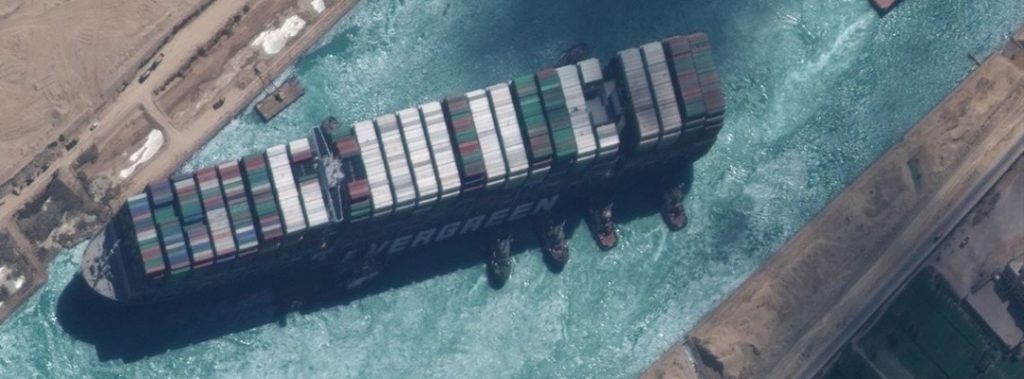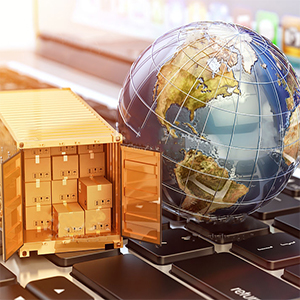The top industries impacted by the Suez blockage
The 400m container ship that blocked the Suez Canal for six days has been freed, but disruption is expected to be felt by supply chains for weeks to come.

The Ever Given ship was dislodged from blocking the canal on 29 March, after almost a week-long mission to move it.
However, an estimated 400 vessels were stuck waiting to pass through the canal during that time, although some were diverted to the route around South Africa, which could add up to two weeks to their voyages.
Analysis from data and analytics provider Dun & Bradstreet and software firm E2open found that European firms were likely to be the most impacted by shipping delays, with the countries hit hardest being the UK, Germany, Belgium, France, Netherlands, Italy, Switzerland, Spain, Turkey and Austria.
The firms added that businesses located in Asia would also be impacted by the delay of shipments from Europe, as well as a shortage of empty containers returning to the region, further stalling their abilities to deliver goods.
However, an estimated 400 vessels were stuck waiting to pass through the canal during that time, although some were diverted to the route around South Africa, which could add up to two weeks to their voyages.
Analysis from data and analytics provider Dun & Bradstreet and software firm E2open found that European firms were likely to be the most impacted by shipping delays, with the countries hit hardest being the UK, Germany, Belgium, France, Netherlands, Italy, Switzerland, Spain, Turkey and Austria.
The firms added that businesses located in Asia would also be impacted by the delay of shipments from Europe, as well as a shortage of empty containers returning to the region, further stalling their abilities to deliver goods.
Pawan Joshi, executive VP of product management and strategy at E2open, said: “While considerable attention has focused on the economic value of cargo trapped on vessels and their inability to move through the Suez Canal, the financial impacts on downstream production that depend on the timely delivery of these materials is magnitudes greater.
“For instance, the delay of an inexpensive but crucial automotive part en route from China can prevent the sale of the entire vehicle in Germany.
The analysis indicated that industries in Europe expected to feel strong effects of these delays include hospitality, construction and wholesale trade.
It also found that the top materials in shipments through the Canal to Europe, and therefore likely to be negatively affected by the delays, included vehicle parts and accessories, garments, electrical and photosensitive materials, wheeled toys such as tricycles and scooters, copper, machines and mechanical appliances, plastics, pharmaceutical goods, and wine.
Brian Alster, general manager, third-party risk and compliance at Dun & Bradstreet, said: “The disaster of the moment becomes a global phenomenon because it is yet another reminder of the interconnectedness that comes with globalisation and our reliance on each other as contributors to the global supply chain.
“Companies have developed a higher level of dependency on suppliers and third parties from other countries, and that dependency is highlighted when a link in the supply chain is impacted.”
“For instance, the delay of an inexpensive but crucial automotive part en route from China can prevent the sale of the entire vehicle in Germany.
The analysis indicated that industries in Europe expected to feel strong effects of these delays include hospitality, construction and wholesale trade.
It also found that the top materials in shipments through the Canal to Europe, and therefore likely to be negatively affected by the delays, included vehicle parts and accessories, garments, electrical and photosensitive materials, wheeled toys such as tricycles and scooters, copper, machines and mechanical appliances, plastics, pharmaceutical goods, and wine.
Brian Alster, general manager, third-party risk and compliance at Dun & Bradstreet, said: “The disaster of the moment becomes a global phenomenon because it is yet another reminder of the interconnectedness that comes with globalisation and our reliance on each other as contributors to the global supply chain.
“Companies have developed a higher level of dependency on suppliers and third parties from other countries, and that dependency is highlighted when a link in the supply chain is impacted.”
The top nine European industries expected to be most impacted by delays through the Suez Canal:
- Eating and drinking establishments
- Construction
- Wholesale trade
- Chemicals and allied product-related businesses
- Health services
- Food retailers
- Industrial and commercial machinery and equipment
- Metal production
- Automotive repair services
Suez Canal blockage expected to impact the hospitality sector most © DigitalGlobe/ScapeWare3d/Getty Images
Headquarter : Mozdeh Junction, Niavaran
Warehouse : 1st Sanat St., Share Quds, Tehran
Warehouse : 1st Sanat St., Share Quds, Tehran
Tel : +9821 – 7520 40 40
Fax : +9821 – 2645 39 12
VOC: +98901 444 99 72
Email : info@kamyartrading.com
KTP ® All Rights Reserved






